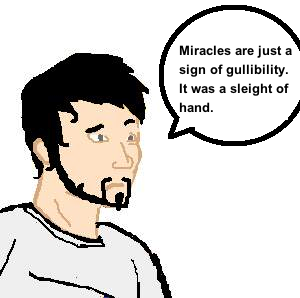 How do you know that religion is true? “Well,” came the reply, “because I have seen the power of God. I have seen a healing.” This is usually regarded by non-believers as a sleight of hand. Some traveling evangelist or faith healer has fooled the masses into believing a fake healing. This is especially prominent in charismatic churches in which healing and miracles are emphasized and said to be witnessed every day. I have personally witnessed fake miracles, and a number of people were taken in by it. This raises the question, are people who believe in miracles just gullible?
How do you know that religion is true? “Well,” came the reply, “because I have seen the power of God. I have seen a healing.” This is usually regarded by non-believers as a sleight of hand. Some traveling evangelist or faith healer has fooled the masses into believing a fake healing. This is especially prominent in charismatic churches in which healing and miracles are emphasized and said to be witnessed every day. I have personally witnessed fake miracles, and a number of people were taken in by it. This raises the question, are people who believe in miracles just gullible?
Now who in the world would even bother attempting to convince the girl that she observed a fake miracle? The very reason that she believes it is because she is emotionally committed to believing it. She wanted to believe it, and therefore she did. But when she describes it to you, it is not very spectacular. However it always seems like the greater the distance, the greater the miracle. The girl can tell you stories about what a friend of a friend heard a faith healer tell you about, and they are indeed very powerful. But she if she tells you what she saw, it is not nearly as impressive. It offers the immediate impression that she is just gullible. That is pretty much how all modern miracle claims sound to the secular audience, that is, just a sign of gullibility.
What does belief in miracles suggest? If somebody says that they believe that miracles are possible, that suggests only that they believe that God exists. This is belief maintained by the majority of the population, including the majority of scientists and academics. There are people who are not gullible in the slightest, and yet believe that God exists. Belief in the existence of God presupposes belief in the possibilities of miracles. After all, what is a miracle?
I am not going to concern myself too much with semi-miracles, such as God’s interaction within the boundaries of the natural world. But rather, a miracle is when God breaks physical laws, such as walking on water, the instantaneous healing of the sick, the raising of the dead. If God exists, miracles such as these really are possible. If somebody believes that God exists, it follows necessarily that they believe that God is capable of interacting in the world.
Of course, that does not mean that we have to believe every miracle story. All of the fake healing, ecstatic tongues and charismatic charlatans; all things that can be explained psychologically or within natural phenomenon, are not necessarily within the rational man’s miracle paradigm. We can believe in miracles without being taken in by every nonsensical story that emerges. In fact, we can even have the liberty to approach miracle claims with an aura of skepticism. If somebody tells you that they received a healing of their leg, but that they are still limping, what kind of healing is that? We do not have to believe everything that everybody tells us about miracles. But how can we know the difference?
Consider the source. Let’s suppose the girl who I mentioned in the introduction, who is very prone to belief in miracles, goes away on a missionary trip to Nigeria. She returns with all sorts of stories of miraculous occurrences. However her reputation for gullibility should be a red flag to you, and you should suspect that perhaps she is romanticizing a tad. She was looking for miracles and she found them. In contrast, if an ardent atheist claims that he saw a miracle, then we will have pause to consider what he is saying because it is obviously unlikely that a skeptic would be vulnerable to a faith healer.
What if I see a miracle personally? This is an interesting question, and most people know that it was addressed by David Hume. Hume argued that since there is always better evidence for the regular than there is for the rare, we should not believe miracles. By definition, he argued, miracles are rare and therefore have less evidence attesting to them. He concluded that if a reasonable man thinks he sees a miracle, he should conclude that he is under a misapprehension.
Consider with me for a moment the implications of this conclusion. If a reasonable person sees a miracle, then he ought not believe it. It seems to me that at this point, we are just abandoning empiricism and observation. It sounds more like atheist rhetoric which tells you to disregard belief at all costs. We must not even give God a hearing, not even if we directly witness the power of God.
Secondly, Hume’s argument is predicated upon premises which are clearly false. The evidence for the regular is not necessarily always better than that for the rare. There is good evidence for things that were rare. The Big Bang only occurred once. The formation of the earth only occurred once. David Hume’s birth only occurred once. As Doctor Frank Turek pointed out, if Hume were alive today, it seems to me that he would not even believe in his own birth. I think it is obvious that if there is evidence for a miracle, then we should believe it.
We have scientific evidence for the greatest miracle ever. In the beginning, God created the heavens and the earth. God brought the entire known universe into existence, and we have scientific evidence to prove that. Any textbook on astronomy will tell you that the universe has not existed forever, but had an absolute beginning some time ago. If that is the case, that means that either the universe popped into being uncaused out of absolutely nothing, like magic, or it had a cause beyond itself. It seems to me to be more reasonable to think that the universe had a cause, rather than the naturalistic assumption of magic. Since it caused nature, space, time, and material, it must be supernatural, spaceless, timeless, and immaterial, which is what everybody means by God. (I argued for this more thoroughly in my article The Kalam Cosmological Argument)
Since we have scientific evidence that the greatest miracle ever occurred, are not the other miracles at least possible? So, are people who believe in miracles just gullible? Or are miracles possible?
If you would like to get in on the discussion about this, join my Theology Discussion Group!